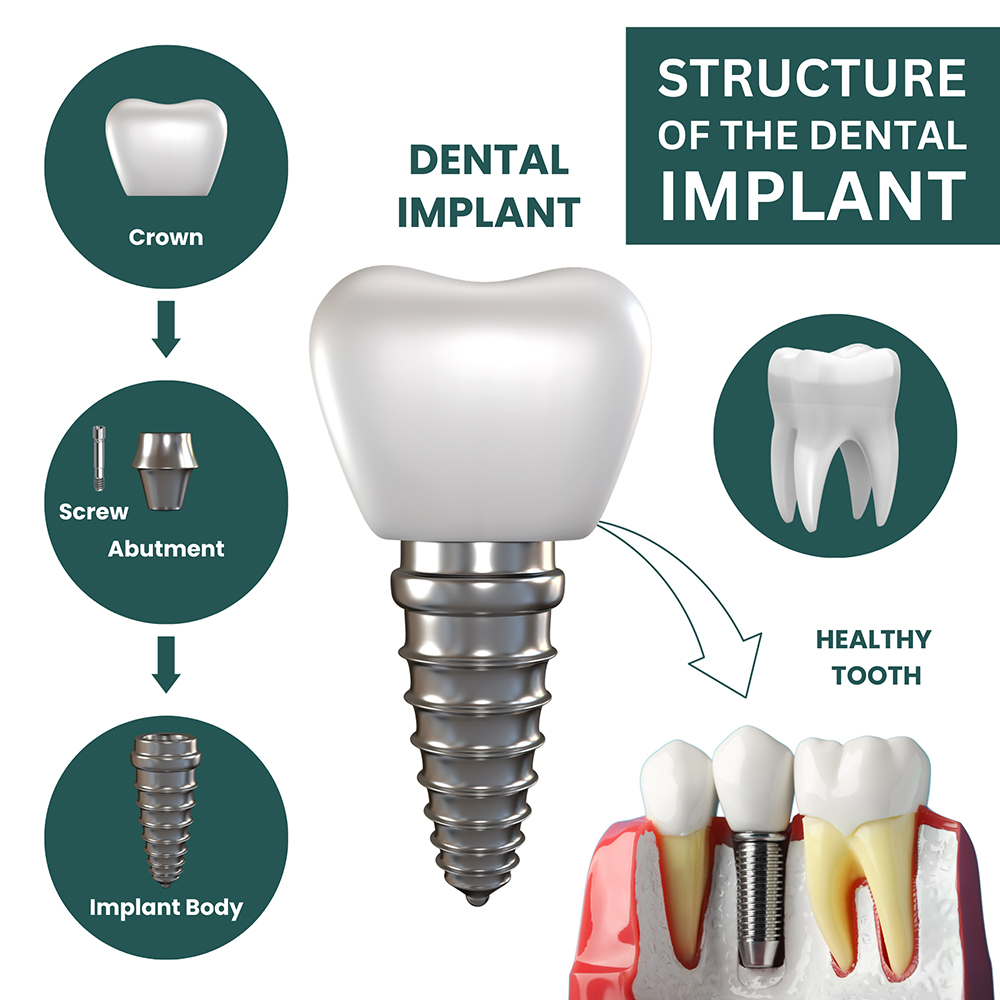What Does Dental Sense Mean?
What Does Dental Sense Mean?
Blog Article
Get This Report on Dental Sense
Table of ContentsDental Sense Can Be Fun For Anyone3 Easy Facts About Dental Sense ExplainedSome Of Dental SenseDental Sense Fundamentals Explained
are clinical devices operatively dental implanted into the jaw to recover an individual's ability to eat or their appearance. They supply assistance for synthetic (phony) teeth, such as crowns, bridges, or dentures. When a tooth is shed as a result of injury or disease, an individual can experience complications such as fast bone loss, defective speech, or modifications to eating patterns that cause pain.Dental dental implant systems include a dental implant body and dental implant abutment and may also consist of a joint addiction screw. Root canal procedure. The dental implant body is surgically put in the jawbone in area of the tooth's root. The oral implant joint is normally connected to the dental implant body by the joint addiction screw and prolongs via periodontals right into the mouth to support the attached synthetic teeth
(http://www.place123.net/place/dental-sense-miami-united-states)Structure of The Dental Implant System choosing oral implants, talk with your dental company about the potential advantages and dangers, and whether you are a candidate for the treatment. Points to think about: Your overall wellness is a vital consider identifying whether you are a good prospect for dental implants, the length of time it will certainly take to heal, and for how long the implant might stay in area.
Cigarette smoking may influence the recovery process and lower the long-lasting success of the dental implant. The healing procedure for the implant body may take a number of months or longer, throughout which time you normally have a momentary abutment instead of the tooth. the oral implant procedure: Meticulously comply with the dental hygiene guidelines provided to you by your oral supplier.
Dental Sense Things To Know Before You Buy
Implant failure can lead to the demand for another procedure to deal with or replace the implant system. Restores the capability to eat Recovers aesthetic appearance Helps keep the jawbone from diminishing as a result of bone loss Maintains the health of the surrounding bone and periodontals Assists keep adjacent (neighboring) teeth secure Enhances lifestyle Damage to surrounding natural teeth during implant placement Injury to the surrounding tissues during surgical procedure, such as sinus opening Injury throughout surgery (for example, fracture of surrounding jawbone) Insufficient feature, such as really feeling like the teeth do not attack with each other normally A sensation that the tooth hangs or turning in position arising from an abutment screw loosening Implant body failing (looseness of the dental implant body) as a result of systemic infection, which might be more probable in individuals with unrestrained diabetics issues because of regional infection in bone and periodontals supporting the implant body as a result of delayed recovery, which may be much more likely in patients that smoke Trouble cleaning up the gum tissues around the dental implant, resulting in bad oral health Neglected periodontal illness Post-surgical pins and needles as a result of nerve impingement or damages Always alert health care providers and imaging service technicians that you have oral implants before any kind of magnetic resonance imaging (MRI) or x-ray treatments.
FDA is not familiar with any unfavorable occasions reported for MRI or x-ray treatments with dental implants. Oral implants systems are normally made of materials that comply with global agreement requirements of the International Company for Standardization (ISO) or ASTM International. These requirements have details of what makes a risk-free product.

An oral implant is a structure that replaces a missing out on tooth. With screw-like tools, the surgeon inserts an implant right into the jawbone, and it works as an anchor for a fabricated tooth, called a crown. A tool called an abutment connects the man-made tooth to the dental implant. The crown is tailor-made to fit the individual's mouth and match the shade of their teeth.
Not known Details About Dental Sense
Some people are not eligible for oral implant surgical procedure. It is for dental cosmetic surgeons to operate individuals with: intense illnessuncontrollable metabolic diseasebone or soft tissue disease or infectionIf these issues are resolved, an individual can have the surgical procedure. In, dental specialists refrain from operating individuals with: If people with any of the above undertake dental implant surgery, there is a greater danger of the implant falling short.

Dental implant surgery is an individualized process. It's not the same for every person. But the following provides a general summary of what you can anticipate your dental practitioner, dental specialist, periodontist or prosthodontist to do: Position the dental implant surgically. Provide you time to recover. Connect the article and final crown, bridge or denture.
Next, your cosmetic surgeon will meticulously position the oral implant into your jaw. Your specialist will reposition your gum tissues and shut the cut with stitches. If your implant is near the front of your mouth, your dental professional will make a short-lived tooth for you to put on up until you heal. That way, you will not have a gap get more in your smile while you recuperate.
Dental Sense - Questions
Your provider can tell you what to anticipate in your circumstance. Throughout the healing stage, your jawbone should fuse to the oral implant. This procedure, called osseointegration, is important for stability and long-lasting success. This procedure can take anywhere from 3 to nine months. Sometimes, it might take longer.
As soon as your dental implant heals, your dental expert can attach the abutment (little port post) and your final repair (crown, bridge or denture). This usually takes about one hour to complete and might call for a 2nd small surgery. You shouldn't really feel any kind of pain during your dental implant procedure due to the fact that your supplier will certainly make use of medication to numb your gums.
Report this page